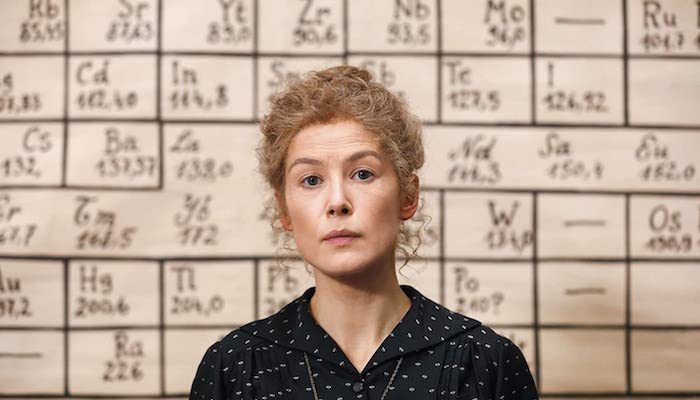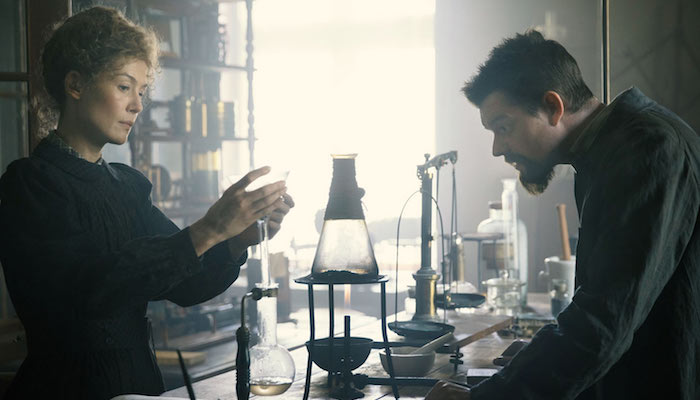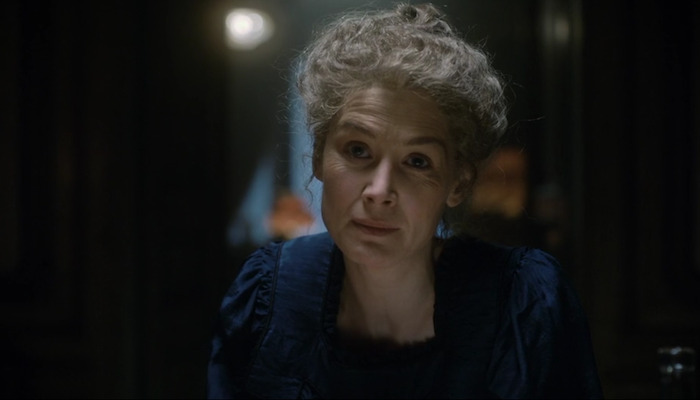Film Review: RADIOACTIVE (2019): Rosamund Pike Succeeds in Marjane Satrapi’s Glowing Adaptation of the Life of Renowned Scientist Marie Curie
Radioactive Review
Radioactive (2019) Film Review, a movie directed by Marjane Satrapi, and starring Rosamund Pike, Sam Riley, Aneurin Barnard, Anya Taylor-Joy, Yvette Feuer, Mirjam Novak, Ralph Berkin, Simon Russell Beale, Sian Brooke, Faye Bradbrook, Drew Jacoby, Harriet Turnbull, Georgina Rich, Elise Alexandre, and Katherine Parkinson.
An unfortunate fact about life is that there will always be some sort of struggle. Throughout the past, present, and future struggle will always be there, with one era always affecting the others in inextricable ways. The real challenge is what we glean from the struggles in each of those realms, and what we do with that subsequent knowledge. Radioactive, the latest from illustrator-turned-filmmaker Marjane Satrapi, deciphers the story of acclaimed physicist and chemist Marie Curie with such a code, highlighting how her personal and scientific struggles paved the way for a technological future as we know it.
Based on Lauren Redniss’ “visual biography” of her life, Radioactive is a look at Maria Sklodowska’s (Rosamund Pike) career after her move to Paris in the 1890s to escape sorrowful memories from her home country of Poland. She has trouble securing funding and finding a space to conduct her experiments, on the account that many of her male colleagues see her determined demeanor as arrogant and off-putting. Upon her dismissal from the university’s science labs, she encounters the ecstatic personality of Pierre Curie (Sam Riley), who takes up a fascination in her research…and a personal interest in herself. Upon falling in love and marrying (wherein she takes his last name and changes her first to sound more French) Marie and Pierre continue the former’s work that eventually leads to the discovery of atomic radiation, as well as the two elements radium and polonium. Firmly dedicated to their joint venture as a couple and as scientific partners overall, they refuse to profit off their discoveries nor supersede each other with academic rewards. But as their work begins to adversely affect their health and people start using their research for incongruous means, they fear that they may have inadvertently started the world down a path towards a bleak, unknown future.
No, Radioactive isn’t free from the tropes that make biographical dramas so emotionally cloying. Jack Thorne’s script connects the historical dots with thick through lines, smudging the idea of unforeseen consequences of progress unavoidably all over the screen. Occasionally these flash-forwards to major 20th-century radiation developments carry appropriate gravitas (the Chernobyl disaster probably plays the best, narratively timed so that it parallels with one of Curie’s late-career breakdowns) but most of the time they drop in with the delicacy of an anvil (the brachytherapy, Hiroshima, and southwestern nuclear testing segments…take your pick as proof). Not to mention that the main narrative is filled with so much foreshadowed blood-coughing and years-later montages that the biopic skeleton can be easily made out through the pale skin.
However, Satrapi does use the biopic’s factual flexibility to her own advantage. Rather than adhering to strict formal expectations (and, according to some people, straight-up facts) Satrapi – a cartoonist and visual storyteller in her own right – uses Redniss’ graphic novel’s visuals and Curie’s overall historical presence as merely jumping-off points for a further look into the psyche of a struggling genius.
“You must always be thinking of something,” Marie tells her eldest daughter, Irene, as she wistfully spaces out, and likewise Satrapi elucidates Marie’s memories, hopes, and fears in fantastical flourishes. The past and the future weave in and out of Curie’s present, reassuring us not only of her prominent scientific discoveries but also of our ability to cause ripples within the stream of history and our subsequent, inescapable legacies.
While not as moving as Satrapi’s 2007 animated adaptation of her graphic memoir Persepolis, Radioactive is plenty of evidence that she can transfer her visual flair across mediums. This is all accentuated by Satrapi’s top-notch collaborators, too, from Anthony Dod Mantle’s beautiful cinematography to Stéphane Roche’s clever editing to Evgueni and Sacha Galperine’s wonderfully anachronistic musical score.
You may wish to take such lauds with a grain of salt as your dear reviewer recently trashed another biopic about a brilliant woman in history, but I’ll leave that up to you. Yet unlike I Am Woman, I’d argue that Radioactive isn’t so concerned with its core character’s brilliance – that’s simply meant to be assumed from the get-go. Rather, it’s more interested in the sociopolitical obstacles which she continuously struggled with throughout her career.
“I suffered much more from lack of resources and funds than I ever did from being a woman,” Marie strictly denotes late in the film, but we as viewers (and as citizens of a patriarchal and capitalist society) know that it’s impossible to disentangle those two. Curie may not have seen sexism as a barrier for her but it undoubtedly played a role in the men in power refusing her accommodations (much less respect), as well as in regard to her eventual public image as a fallen woman (which further fueled the xenophobic fervor aimed against her).
Satrapi and Thorne also depict how Curie was forced to witness the bastardization of her research in real time, as charlatans used radiation as a theatrical gimmick or as an untested medical cure-all. Marie’s witnessing of these exploitations plays to a more personal (and thus more effective) level than any of the flash-forwards to future atomic horrors do. When coupled with the aforementioned xenophobic and sexist backlash that festered in the aftermath, Curie’s struggles become complex and multi-dimensional beyond your basic biopic triumphs.
Pike portrays Curie with a sense of resilience and strong will. The breathy tics and stern motions that she imbues Marie with showcase the scientist’s committal to her work, all the way down to the subconscious level. Likewise, Pike also shows us cracks into this determination, as evidenced in Marie’s inability to properly feel sorrow or mourn (shown instead through awkwardly-stifled cries and delayed panic attacks). And yet that determination also conjures a sense of charm, and thus Pike makes Marie feel realistically robust.
Radioactive sometimes submits to formula but it changes up the equation in sparkling ways. It might not be as game-changing as its subject, but it’s still a delightful discovery.
Rating: 7/10
Leave your thoughts on this Radioactive review and the film below in the comments section. Readers seeking to support this type of content can visit our Patreon Page and become one of FilmBook’s patrons. Readers seeking more film reviews can visit our Movie Review Page and our Movie Review Pinterest Page. Want up-to-the-minute notifications? FilmBook staff members publish articles by Email, Twitter, Instagram, Tumblr, Pinterest, and Flipboard.
Related Articles
FilmBook's Newsletter
Subscribe to FilmBook’s Daily Newsletter for the latest news!















